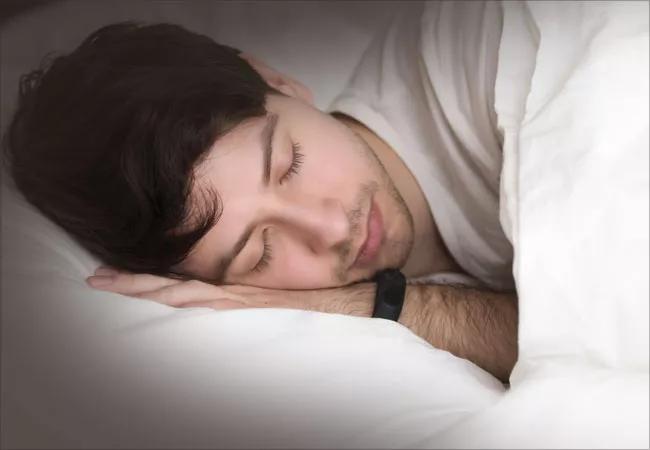How data from your device can help you

Image content: This image is available to view online.
View image online (https://assets.clevelandclinic.org/transform/609d7c18-f239-46c3-baa6-3e15eb2ad178/trackSleep-668624272-650x450_jpg)
Man wearing a fitness watch on his wrist while sleeping in bed.
Think you need more sleep, or better sleep? Then you may be looking into wearable devices and apps that track sleep.
Advertisement
Cleveland Clinic is a non-profit academic medical center. Advertising on our site helps support our mission. We do not endorse non-Cleveland Clinic products or services. Policy
Are they worthwhile? “Yes, they are,” says sleep medicine expert Colleen Lance, MD.
“While digital apps and devices can’t replace formal testing, they can give your doctor a general idea of your total sleep time, your sleep/wake cycle and how disruptive your sleep may be.”
This can help your doctor decide whether to refer you to a sleep specialist or for a sleep study.
Many people who rely on wearable technology to count steps, or measure the miles they run or cycle, stumble upon the sleep-tracking function accidentally.
Here are three good reasons to track your sleep, says Dr. Lance:
Advertisement
All wearable devices use an accelerometer to sense motion. (When you move, you’re awake; when you don’t, you’re asleep.)
But there’s a big difference between your Fitbit®, Jawbone UP®, or Apple or Android watch and an FDA-approved medical device like the Actiwatch®.
“When researchers compared the Actiwatch to a formal sleep study, they found that it accurately measured total sleep and total wake time,” says Dr. Lance.
“The Actiwatch can also tell us when the sleep/wake cycle is off, which we look for in teens with insomnia.”
Because the Actiwatch can cost several thousand dollars, sleep study program often loan it to patients for testing.
How well do the more affordable wrist-worn devices stack up against the Actiwatch?
In one American Academy of Sleep Medicine study, researchers had patients wear an Actiwatch along with several popular commercial wearables during a sleep study in the sleep lab.
“Overall, the commercial devices measured overall sleep time, and the amount of overnight sleep, pretty well,” says Dr. Lance. “But their accuracy dropped when measuring short naps during the day.”
It’s important to track the time you spend napping, because that can influence how well you sleep at night.
“Your smart watch or fitness device is also likely to overestimate sleep efficiency — the percentage of time you’re actually asleep while in bed,” she says.
Some commercial wearables claim to track the time you’ll spend in light versus deep sleep. (You sleep deeply during the slow-wave and the REM, or rapid-eye-movement, stages of sleep.)
“During REM sleep, your brain catches up on its rest,” explains Dr. Lance. “During slow-wave sleep, your body catches up physiologically on its rest.”
But no device — not even the Actiwatch — can track light or deep sleep very well, she stresses. If you want to track the stages of sleep, you’ll need to have EEG leads placed on your head in a sleep lab.
“But even though not all wearable devices are FDA-approved, and not all of their data is great or validated, they are still useful,” she says. “We don’t want to throw the baby out with the bathwater.”
If you don’t want to wear a wrist device, you can also download a sleep app on your smartphone, laptop, tablet or desktop computer.
Different sleep apps have different features. For example, with the Sleep by Cleveland Clinic app, you can assess your sleep disorders risk, learn useful strategies to sleep better and find out how to get expert help.
Advertisement
Many good apps are free or relatively inexpensive; reading product reviews can be helpful.
“There is one caveat: If you tend to be anxious, tracking your sleep may not be helpful,” cautions Dr. Lance.
Some people can become obsessed with their device, checking their data constantly and worrying about whether it’s normal to awaken during the night.
“But we all awaken at night,” she says. “The question is, do we fall back asleep OK, and can we function OK the next day?”
Wanting to track your biometric data, however, is generally a good thing, Dr. Lance believes. It means you’re more likely to follow doctor’s orders and do what it takes to maximize your well-being.
“Consumer sleep technologies offer a wonderful, relatively inexpensive way to become more engaged in your overall health,” she says.
Advertisement

Sign up for our Health Essentials emails for expert guidance on nutrition, fitness, sleep, skin care and more.
Learn more about our editorial process.
Advertisement
Research suggests that we should be snoozing by 10 p.m.
Find out how to break this popular pandemic habit
Break up with your snooze button by shifting your bedtime and establishing a consistent nighttime routine
Resolve to move a little more, drink a little less, eat a little healthier, sleep a little better and destress a lot
An ice bath can ease sore muscles and decrease inflammation after a workout
Head to bed in a bra to reduce breast pain, nipple irritation and stretch marks
Winding down before bed is key to better sleep
If they affect the quality of your sleep, keep your pets out of your sheets
Type 2 diabetes isn’t inevitable with these dietary changes
Applying a hot or cold compress can help with pain
Pump up your iron intake with foods like tuna, tofu and turkey